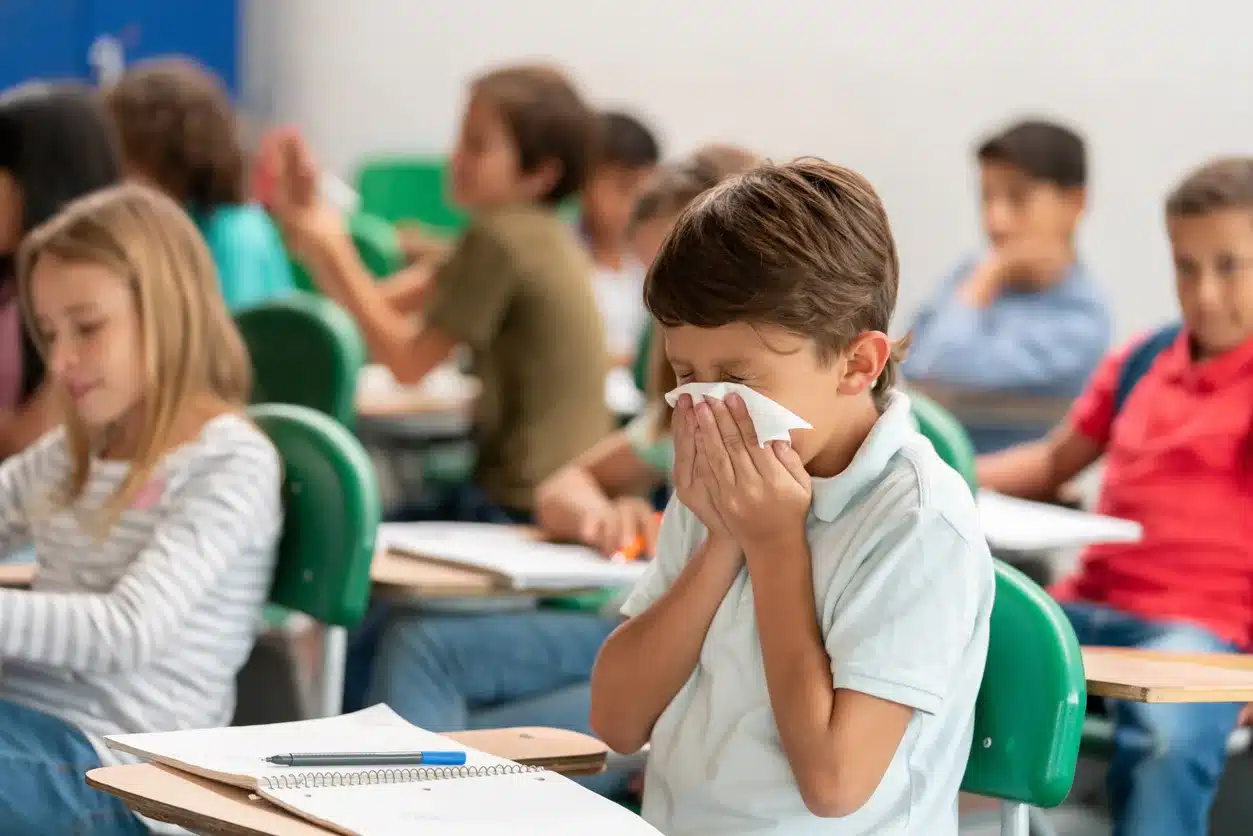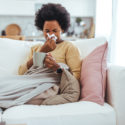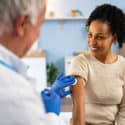
Fall brings so many things to look forward to—the start of a new school year, cooling temperatures, and football under the Friday night lights. But as kids gather in new classrooms, they share more than stories about their summer adventures—they often share their germs, which they then bring home to share with the family.
More indoor activities and large group gatherings each fall bring a few things we don’t look forward to – fall illness. The most common ones we see include:
- Allergies
- Asthma exacerbations
- Common cold
- COVID
- Hand, foot, and mouth disease
- Infectious mononucleosis
- Influenza
- Pink eye
- Stomach flu
- Strep throat
Let’s take a closer look at each one and then talk about how you can prevent these unwelcome fall foes.
Allergies
Some common fall allergy offenders are burning bush, cocklebur, lamb’s-quarters, mold spores, mugwort, pigweed, sagebrush, tumbleweed, and Russian thistle. The one that affects most people is ragweed, which can be found throughout the US and releases its pollen from August to November.
Fall allergies cause allergic rhinitis or hay fever. Symptoms include:
- Allergic conjunctivitis – itchy, red, watery eyes
- Congestion
- Runny nose
- Sneezing
Asthma Exacerbations
If you or your child has asthma, fall allergies and cooler temperatures could cause intense asthma symptoms. Avoid known allergens and use your prescribed asthma medications as directed.
Seek immediate medical attention if you or a family member experience a severe asthma attack unrelieved by your rescue inhaler, such as shortness of breath accompanied by:
- Breathing more than 30 breaths per minute for an adult or 40 breaths per minute for a child between one and 12 years of age.
- Heart rate greater than 120 beats per minute for an adult or 160 beats per minute for a child between one and 12 years of age.
- Inability to speak in complete sentences.
Common Cold
More than 200 respiratory viruses can cause the common cold, but the most frequent cause is the rhinovirus. You can get a cold any time of the year, but the cooler temperatures in the fall and winter months and increased socializing indoors increase the spread of viruses that cause colds.
Signs and symptoms include:
- Cough
- Headache
- Low-grade fever (less than 100.4° F)
- Mild body aches
- Nasal congestion or runny nose
- Sneezing
- Sore throat
There are no vaccines or antiviral medications for the common cold. Symptoms usually peak around the second or third day of a cold and resolve after seven to ten days. To help relieve symptoms, we recommend over-the-counter (OTC) medications such as acetaminophen for fever or decongestants for congestion.
You should contact your healthcare provider if you or your child has:
- Dehydration.
- Difficulty breathing.
- Fever lasting longer than four days or a fever higher than 100.4 in kiddos younger than three months.
- Symptoms that improve and then return and are worse than before.
- Symptoms that last longer or worsen after ten days.
COVID
COVID is a respiratory infection caused by COVID-19 and SARS-CoV-2 viruses. The viruses infect the respiratory tract, including the nose, lungs, and throat, and are spread by respiratory droplets when an infected person breathes, coughs, sneezes, or talks.
Signs and symptoms can vary widely among different people and may include:
- Body aches
- Chills
- Cough
- Diarrhea
- Feeling tired
- Fever
- Headache
- Loss of smell or taste
- Nasal congestion or runny nose
- Nausea and vomiting
- Shortness of breath with activity
- Sore throat
Most kiddos have mild symptoms. People with underlying chronic illnesses, such as COPD, Diabetes, or heart disease, and older adults may have more severe symptoms.
A COVID vaccine is recommended for most people over the age of five. If you have severe shortness of breath or worsening underlying health conditions, you should contact your healthcare provider or seek medical attention.
Hand, Foot, and Mouth Disease
Hand, foot, and mouth disease (HFMD) is a common viral childhood illness that tends to peak in the fall when school starts. Adults may also contract HFMD if exposed. Symptoms start with:
- Decreased appetite
- Feeling tired
- Headache
- Low-grade fever
- Runny or stuffy nose
- Sore throat
- Stomachache
Once the initial symptoms resolve, the following symptoms appear:
- Mouth sores
- Skin rash
- Swollen lymph nodes
There are no vaccines or antiviral medications to treat HFMD. OTC medications can be used to help relieve discomfort for symptoms. HFMD usually lasts seven to ten days.
Call your healthcare provider if your child:
- Develops a high fever, neck stiffness, and backache.
- Has difficulty drinking and has symptoms of dehydration, such as a dry mouth or urinating less frequently.
- Is not getting better after ten days.
- Is younger than six months old.
Infectious Mononucleosis
Mono, or infectious mononucleosis, is most commonly caused by Epstein-Barr virus (EBV) but may also be caused by other viruses. It is a common fall disease among teenagers and young adults. The signs and symptoms include:
- Body aches
- Extreme tiredness
- Fever
- Headaches
- Rash
- Swollen lymph nodes in the neck and armpits
- Swollen liver, spleen, or both
There is no vaccine or antiviral medication for mono. It usually lasts two to four weeks. Antibiotics should be avoided while infected with mono. The following are recommended for symptom relief:
- Drink plenty of fluids to stay hydrated.
- Get plenty of rest to help recover.
- Take OTC medications for fever and pain relief.
Influenza
Flu is a highly contagious respiratory illness caused by influenza viruses. The flu season starts in the fall and peaks in the winter months.
Symptoms include:
- Body aches
- Chills
- Cough
- Fever
- Headaches
- Nasal congestion or runny nose
- Sore throat
An annual flu shot is recommended for most people six months of age and older. The vaccine can prevent flu or reduce the severity of symptoms. Antiviral medications can also reduce the length and severity of symptoms if they are started within the first day or two of symptoms, but they may have uncomfortable side effects.
Pink Eye
Conjunctivitis, commonly called pink eye, can be caused by a bacterial infection, viral infection, or allergens. Symptoms include:
- Burning, itchy, and irritation of the eye
- Discharge from the eye
- Eyes “matted” closed in the morning with a yellow or green crust
- Pink or redness in the white of the eye
- Swelling of the eyelid
- Watery eyes
There is not a vaccine specific for pink eye, but some pink eye infections may be prevented by staying current with vaccines for other diseases associated with pink eye, such as:
- Chickenpox
- Haemophilus influenzae type b (Hib)
- Measles
- Pneumococcal
- Rubella
- Shingles
Your healthcare provider may prescribe antibiotic eye drops if you or your child have bacterial pink eye.
Stomach Flu
The highly contagious norovirus causes inflammation in the stomach and intestines, often called the stomach flu. You usually develop symptoms within 12 to 48 hours after exposure to norovirus. Symptoms include:
- Body aches
- Diarrhea
- Fever
- Headache
- Nausea
- Stomach pain
- Vomiting
There is no vaccine or antiviral medication for the stomach flu. Symptoms usually resolve after one to three days.
The greatest complication of stomach flu is dehydration. You should contact your healthcare provider if you or your child have symptoms of dehydration such as:
- Crying with few or no tears
- Decreased urination
- Dry mouth and throat
- Feeling dizzy when standing up
- Unusual tiredness or fussiness
Strep Throat
Group A Streptococcus causes a bacterial infection in your throat and tonsils called strep throat. It is more common in children ages five to 15 and is very contagious. Symptoms include:
- Fever
- Pain with swallowing
- Red and swollen tonsils
- Sudden sore throat
- Swollen lymph nodes
- Tiny, red spots on the roof of the mouth (petechiae)
- White patches or streaks of pus on the tonsils
Strep throat can be treated with antibiotics. MainStreet Family Care urgent care services can help! Register online to visit one of our clinics for strep throat testing and treatment so you can heal and feel better fast!
Preventing Fall Illness
Here are our top ten pro tips for preventing the most common fall illnesses:
- Wash your hands! And teach your kids to wash their hands. Hand washing is the single greatest intervention to prevent the spread of bacterial and viral fall illnesses. Wash your hands –
- After you cough or sneeze.
- After you use the restroom.
- After you touch unclean surfaces.
- Before and after you prepare meals and eat.
Wet your hands with warm water, apply soap, and rub your hands together for at least 20 seconds before rinsing and drying them with a clean towel. If soap and water are not available, use alcohol-based hand sanitizer.
- Avoid touching your eyes, face, mouth, or nose unless you have just washed your hands.
- Clean frequently touched surfaces in your home, such as countertops, door knobs, faucet handles, and toilets to prevent the spread of germs.
- Cough and sneeze into your elbow rather than your hands. You are less likely to spread germs from your elbow or sleeve than your hands.
- Do not share drinks, food, or personal items like eye drops, makeup, and toothbrushes with people who are sick.
- Keep your child home from school if they are running a fever or have symptoms to prevent the spread of fall illnesses. Likewise, you should stay home from work if you feel ill or have a fever.
- If you or your child has asthma, talk to your healthcare provider about a rescue inhaler for fall-related exacerbations.
- If you suffer from fall allergies –
- Ask your healthcare provider about taking an antihistamine.
- Consider using an air purifier.
- Watch your area’s daily mold spore and ragweed reports and opt for indoor activities when the counts are high.
- Maintain a healthy immune system to protect from fall illnesses by:
- Drinking plenty of fluids to remain hydrated.
- Eating a healthy diet rich in whole, unprocessed foods.
- Getting vaccinated with the annual flu vaccine and staying current with all recommended vaccines.
- Managing stress with deep breathing, meditation, mindfulness, or yoga.
- Participating in regular physical activity.
- Prioritizing quality sleep every night.
- Stay on top of your overall health with a primary care partner.
Turn to MainStreet Family Care
Suffering from a common fall illness? MainStreet Family Care urgent care services can help you heal and feel better fast!
Register online to visit one of our clinics near you. You can wait from the convenience of your home or car until we’re ready to see you. We’ll text you when it’s time to head to the clinic.
We also accept walk-ins! However, please be aware that walk-ins join the same queue as those who register online and may experience longer in-clinic wait time.






